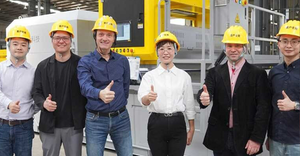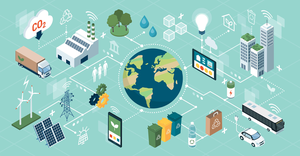A new EPA study shows the role consumption plays in climate change.
The title may be a mouthful, but a new study from the U.S. Environmental Protection Agency, “Opportunities to Reduce Greenhouse Gas Emissions through Materials and Land Management Practices,” is a fascinating look at where America's greenhouse gas emissions are produced. More importantly, it details how recycling and waste management can help lower those emissions.
The study is important because increased generation of carbon dioxide, methane and other greenhouse gases cause climate change. Usually, their production is assigned to “sectors” such as electric power generation, transportation and industry. This new study assigns their production to “systems” such as “materials management” and “land management.”
“Materials management” includes the “provision of goods,” meaning the extraction of raw materials, the manufacture and transportation of products, and the eventual recycling and disposal of those products. It also includes the “provision of food,” which includes growing, processing, and composting or disposing of food. All of these activities account for 42 percent of U.S. greenhouse gas emissions. Land management (houses, buildings, parks, etc.) is responsible for 16 percent. The remainder is divided among three other categories.
No one should be surprised that providing food and making things generates greenhouse gases. In any society, these activities are going to be among the prime suspects because they are essential to life and to the economy. Notably, the agency avoided estimating the impact on greenhouse gas production if we ate less or bought fewer things.
Instead, EPA's next step was to analyze “technical potential scenarios” for a wide range of waste management policies in order to estimate their impact on greenhouse gas emissions. Achieving a 100 percent recycling rate is by far the most significant impact. Total recycling could lower our greenhouse gas emissions by about 4 percent. The next biggest impacts would be achieved through a 100 percent construction and demolition debris (C&D) recycling rate and capturing 100 percent of currently emitted landfill methane for electricity generation. Each would reduce greenhouse gas emissions by about 2 percent.
The study goes on to note that current materials management practices such as recycling, waste-to-energy and EPA's Partnership programs like Waste Wise and Plug in to eCycling have lowered greenhouse gas emissions by more than 2 percent a year. Oddly, EPA omitted the contributions made by landfill gas recovery projects from this list, even though the agency touts them as one of the most effective materials management policies. According to another agency study, those projects lowered greenhouse gas emissions by about one percent.
EPA acknowledges flaws in its study, such as the lack of C&D recycling data. Unfortunately, the agency does not note that its data assumes that all recycling occurs in this country. Many of our recyclables are exported to China and other countries where they are remade into new products. Most of those countries have shown little interest in lowering their greenhouse gas emissions.
The agency's most important caveat is that its estimates do not take into account “economic, institutional or technological limitations.” In other words, we could achieve these results only in a perfect world.
Unfortunately, the world is not perfect. EPA is now figuring out how these policies will work in the real world. Nonetheless, the study demonstrates the role solid waste and recycling can play in combating climate change and in lowering greenhouse gas emissions.
Related Stories
Chaz Miller is state programs director for the Environmental Industry Associations, Washington, D.C.
Opinions in this column do not necessarily reflect those of the National Solid Wastes Management Association or the Environmental Industry Associations. E-mail the author at [email protected].
About the Author(s)
You May Also Like




